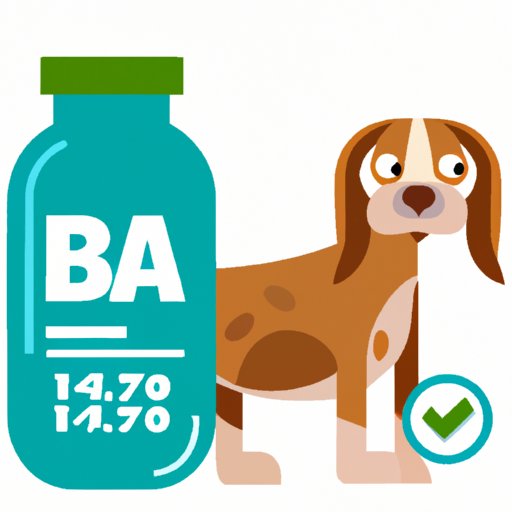
I. Introduction
Constipation is a common problem in dogs, and it can be a source of discomfort for them if left untreated. This condition refers to the difficulty or infrequent passing of stool. In this article, we will explore the causes of constipation in dogs and provide tips and strategies to relieve it. As a responsible pet owner, it is crucial to understand and address this issue promptly to maintain a healthy lifestyle for your furry friend.
II. Understand the Causes of Constipation in Dogs
There are various reasons why a dog may suffer from constipation. Understanding these causes can help to prevent and treat constipation:
Dehydration
Inadequate water intake can lead to dehydration, causing the stool to become dry and hard to pass. Dogs facing this issue may show signs of lethargy and a dry nose. As dogs cannot drink enough water themselves, you need to ensure they are getting enough water daily.
Lack of Exercise
Dogs require regular exercise to stay active and healthy. A sedentary lifestyle can lead to constipation, as their digestive system slows down. Walking, running, and playing are good ways to keep your dog active.
Blocked Anal Glands
Dogs have anal glands, which can clog and cause constipation. Signs that a dog’s anal glands are blocked include excessive licking of the anal area, scooting, and foul odor. It is best to consult with a veterinarian for treatment.
Certain Medications
Sometimes medications can cause constipation in dogs, so it’s essential to check with a veterinarian regarding the side effects of any medications given to the dog. If a medication is causing constipation, the treatment plan must be modified.
Prevention Measures
Preventing constipation is the best way to maintain your dog’s digestive health. Feeding them a well-balanced diet, providing them with enough water, exercise, and routine veterinary care are essential prevention measures.
III. Modify the Dog’s Diet
Dietary changes are an effective way of addressing constipation in dogs.
Importance of a High-Fiber Diet
High-fiber foods can help regulate a dog’s digestive system and prevent constipation by producing softer stools. You should aim to ensure that your dog’s food contains adequate fiber.
Foods to Add to the Dog’s Diet
There are several foods that can help relieve constipation in dogs. Adding lean proteins such as chicken, fish, and turkey, a small amount of canned pumpkin or sweet potato, and green beans to your dog’s diet can help regulate your dog’s bowel movement. Fiber-rich treats like carrots or apples are also beneficial.
Foods to Avoid in the Dog’s diet
Avoid giving your dog high-fat foods, bones, and table scraps as they can cause gastrointestinal upset and constipation.
IV. Increase Hydration Levels
Importance of Fresh Water
Water is essential to a dog’s health. Ensure that your dog always has access to fresh water. Dehydration can cause the stool to become hard and difficult to pass.
How to Ensure Dogs are Getting Enough Water Each day
Ensure that your dog’s water bowls are changed regularly throughout the day. You can also add flavored broth to their water or ice cubes to encourage them to drink more water. Adding wet food to their diet can also increase hydration levels.
V. Encourage Physical Activity
Importance of Exercise for Dogs
Dogs require regular exercise to stay active and healthy. A sedentary lifestyle can lead to constipation, as their digestive system slows down. Walking, running, and playing are good ways to ensure your dog gets enough exercise.
Types of Exercises to Increase Physical Activity
It’s essential to engage your dog in regular exercise to prevent constipation. You can engage your dog in several activities such as playing fetch, going for a hike, or playing in a dog park to keep them active.
VI. Consider Natural Remedies
Natural Remedies for Relieving Constipation in Dogs
There are several natural remedies to help relieve a dog’s constipation, including:
- Adding a small amount of pureed pumpkin, sweet potato, or green beans to their diet as a source of fiber.
- Giving warm water enemas can help stimulate bowel movements.
- Herbal remedies like chamomile tea and fennel can have a soothing effect on the digestive system by reducing inflammation. It is best to consult with a veterinarian before giving any herbal remedies to your dog.
How to Implement Natural Remedies in the Dog’s Diet
Introduce natural remedies gradually to your dog’s diet to avoid stomach upset. Start with small amounts and observe how your dog responds before increasing the dosage.
VII. Consult a Veterinarian
When to Seek Veterinary Help for Persistent Constipation
If your dog suffers from persistent constipation, it’s time to see the veterinarian. It could be due to underlying medical conditions such as intestinal blockage, tumors, or inflammation. An expert evaluation can help diagnose and address other underlying health issues.
Possible Medications or Treatments Suggested by Veterinarians
Depending on the cause, veterinary treatment may include medications, diet changes, fluids, or surgery. Supplements such as fiber supplements, probiotics, and stool softeners may help alleviate the symptoms of constipation.
VIII. Conclusion
Constipation can be a challenging issue to address, but with the right approach, you can help get your dog’s bowel movements back on track. It’s essential to understand the causes of constipation in dogs and take preventative measures to promote a healthy digestive system. Encourage physical activity, modify their diet, increase hydration, and use natural remedies to relieve constipation in dogs. If the issue persists, it’s essential to seek veterinary attention.
By following the tips we have shared, you can help relieve your dog’s constipation and improve their quality of life. Remember to apply these principles and make necessary modifications to your dog’s lifestyle to keep them healthy.




